Aaron Roth – HOPE International – April 2011
- Download this email as a pdf: Aaron Roth – April 2011 Update.pdf
- Blog and Support Page: www.AaronRoth.net/support/
- HOPE International Worldwide – www.HOPEinternational.org
- Newsletter Archive: AaronRoth.net – Monthly Newsletters
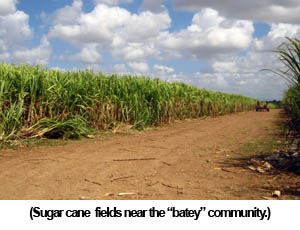 “I used to think sugar came from a box in the supermarket.” I’ve gotten a lot of laughs with that kind of small talk around the topic of sugar, and in particular with that statement. Usually, the Haitians who have emigrated here for employment and work with the sugar cane everyday laugh when they hear it, and ask what else Americans really think. Here in the Dominican Republic, sugar production is still a major export, and if you explore a little bit beyond the major cities you’ll find enormous sugar cane fields, and the sugar cane communities (“bateys”) of people who work in those fields.
“I used to think sugar came from a box in the supermarket.” I’ve gotten a lot of laughs with that kind of small talk around the topic of sugar, and in particular with that statement. Usually, the Haitians who have emigrated here for employment and work with the sugar cane everyday laugh when they hear it, and ask what else Americans really think. Here in the Dominican Republic, sugar production is still a major export, and if you explore a little bit beyond the major cities you’ll find enormous sugar cane fields, and the sugar cane communities (“bateys”) of people who work in those fields.
The sky is big and the air is clean. Life is quiet, and a soft breeze sweeps through the fields. There isn’t usually electricity in the communities, and consequently there aren’t any TV’s or radios to create noise. My first experience entering the rural area (campo) was on the back of a motorcycle of a loan officer with HOPE. I felt like I had returned back to Iowa where I was a kid. Next to our house in Iowa there was a dirt road where my brother and I used to ride our bikes. We usually stopped at the cemetery because our mother didn’t want us to go riding off into the sunset. So I never traveled beyond the cemetery to explore the dirt road that kept going on in the distance.
With Francisco, the loan officer of our La Romana office, I felt like I got the chance to see what lay beyond the cemetery. Now I know, and I can tell you, there’s a grove of mangoes (almost ripe for picking), corridors of sugarcane fields separated by tiny dirt roads where men lead their oxen and carts to carry the cut sugar cane to be weighed, and a community of pleasant and amiable Haitians. I thought of the famous quote from Field of Dreams: “Is this Heaven, no it’s Iowa” and I’ll say that the beauty of the sugar cane fields felt a lot like Heaven, and yes, Iowa as well because the 12ft high sugar cane looked a lot like corn to me.
What Does “Tuah Cuah” Mean?
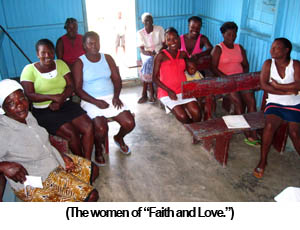 Back in February, I know I made the joke that if the “Lord wants me to learn Creole then I’ll do it.” Now it’s looking like I might actually head down that path. The women of the Bank of Esperanza “Fe y Amor” (Faith and Love) of Batey Community #62 graciously accepted the task of teaching a “gringo” his first few words and phrases in Creole.
Back in February, I know I made the joke that if the “Lord wants me to learn Creole then I’ll do it.” Now it’s looking like I might actually head down that path. The women of the Bank of Esperanza “Fe y Amor” (Faith and Love) of Batey Community #62 graciously accepted the task of teaching a “gringo” his first few words and phrases in Creole.
I’m thinking I may continue the education more seriously, as the feeling of joy I get increases with each smile I see on the faces of our clients. When you know someone’s native language, you can connect with them on a deeper, more personal level and I want to continue that. For now, the conversations are in Spanish, and when someone said the phrase “Tuah Cuah,” I had to ask, “What does that Spanish phrase mean?”
“It’s actually Creole, and it’s, ‘tres cruces’ in Spanish,” Franklin explained to me, “because the client writes three crosses on the loan application form when they don’t know how to write.”
“They don’t know how to write?” I asked. “Yes, we find that a lot here in these batey communities. The women don’t know how to write, yet.” I then watched as three different women signed their loan application forms with their signature: “tuah cuah.”
None of the women make jokes about illiteracy, but add that when someone will be able to write, they can write notes to their children like “Where did you put the dishes when I wasn’t here . . .” I love that. I love the sense of comradery and solidarity between these women. They are accepting and edifying to each other in the process of development of their small businesses, their community, and their families. Still, it’s shocking to me to meet these women who are 30 or 40 years old and don’t know how to write, and their kids do. It’s usually because they missed the education opportunities when they were children that are now available to the young generation. Generally, it’s a little more common to meet an older woman that doesn’t know how to write, and very often it’s difficult to know just how old these women are.
“. . . and How Old Are You?”
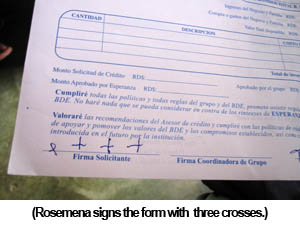 That afternoon Franklin and I went to visit a group of associates’ homes to verify their places of residence and their businesses. We stopped by the house of one woman in the community, Rosemena, to do the survey of poverty. We usually ask for the national identification card or their passport. Rosemena had neither.
That afternoon Franklin and I went to visit a group of associates’ homes to verify their places of residence and their businesses. We stopped by the house of one woman in the community, Rosemena, to do the survey of poverty. We usually ask for the national identification card or their passport. Rosemena had neither.
We asked Rosemena, “When were you born?”
She answered, “I don’t know.”
“Do you know how old you are?”
“I think I’m 30.”
“When did you celebrate your birthday?”
“I wanted it to be in early March so I chose, March 6th.”
“Ok, we’ll put your birthday as 3/06/80. Can you sign this form?”
“I don’t know how to write.”
“That’s ok, you can just write ‘tuah cuah’ here.” (Rosemena smiles and signs the form with three crosses.)
Rosemena has three children and she will be using her six-month loan of $75 of HOPE to buy food and drinks to sell in the community. We told her that now since she is a HOPE client, she can come to the literacy classes for free – “You can learn to write your name.” (HOPE, in addition to being a microfinance organization, offers free business, educational, medical and dental services to their clients.) “Yes, that sounds good to me. I want to do that.” she politely smiled as she responded.
Do You Know How to Write Your Name?
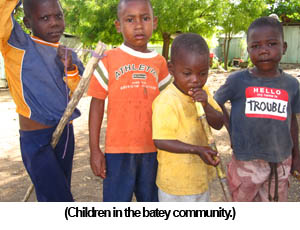 On our way back to the office, we made a quick stop to visit a group of clients. Francisco likes to check in with his HOPE clients to see how their family and business are doing. We pulled up to a house and a young woman came out, holding her child. “Hi Franklin, how are you!” – she yells. Franklin greeted her and introduces me, “This is my American friend who wants to learn Creole.”
On our way back to the office, we made a quick stop to visit a group of clients. Francisco likes to check in with his HOPE clients to see how their family and business are doing. We pulled up to a house and a young woman came out, holding her child. “Hi Franklin, how are you!” – she yells. Franklin greeted her and introduces me, “This is my American friend who wants to learn Creole.”
“Oh he does?” (She’s smiling now.)
“Yes, I’d like to learn some Creole.” I say.
“Sit down, I will teach you some.” She goes inside and brings out a wooden chair for me to sit on, and then one for her as well.
“What is your name?” I ask.
“It’s Francisca.” She responds.
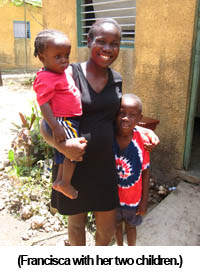 (I pull out my pad of paper to write her name down so I can remember.)
(I pull out my pad of paper to write her name down so I can remember.)
“Oh, you know how to write!!!” She exclaims.
“Yes, I can write in English, and a little bit in Spanish.”
“Oh, I can speak Spanish well, because with my business I sell in these 3 communities, and I am very good at selling, and making money for my family, but I want to learn to write. I am going to take the writing and reading class that HOPE has.”
I stop for a minute and think that I am going to write about this conversation with Francisca, and that this ability, the ability to convey my thoughts, ideas, and hopes with pen and paper is a rarity and a gift for many people in developing countries like this one. Whenever I want, I can communicate to my friends and family – and she cannot, yet, and marvels at the possibility of this coming soon.
How blessed are we, that we can write our own names. That we can write letters or emails to the people we care about. I never thought that reading and writing were a privilege, but they are. To be able to write to you is a privilege. To receive emails from my family and friends in Broadway, my friends in Richmond, my fellow members at WEPC, and well, anybody from the States, is truly a joy and a blessing. The ability to write is something that Rosemena and Francisca are looking forward to learning, much like the arrival of a birthday and the gifts and celebration it will bring.
Remember when you used to write messages to your parents, and they would put them up on the refrigerator? Or when you’re parents would write you notes in your lunchbox? Imagine the day when these women will be able to write notes to their children, and be able to read what their children write back to them, and you know what – you can smile, because:
that day is coming soon . . .
Blessings to you and your family, in His name,
-Aaron Roth
Skype: aprothwm05
————————————————————————————————
While I’m volunteering down here in the Dominican Republic, I am still finishing the final part of my fundraising through the remainder of the year. Do pray for the work of HOPE and if you feel led to support me financially, you can find that information here.
Online Contributions:
- Go to www.HopeInternational.org and select the “Donate Now” green tab on the right-hand side of the screen (or click this link: “HOPE International – Donate Now”)
- Under “Allocate your Gift,” find the “Contribution Preference Amount” drop down box
- Select “Other (please specify below)”
- *In the box beside “Other Gift Designation”, write “Fellow: Aaron Roth”
Contributions by Mail (send a check):
HOPE International
Joan Bauman, Donor Care Administrator
227 Granite Run Dr. – Suite 250
Lancaster, PA 17601
Please make all checks payable to:
HOPE International and put “Fellow – Donation: Aaron Roth” in the memo line.
According to IRS regulations, all contributions are treated as donations and are tax deductible to the full extent of the law.
